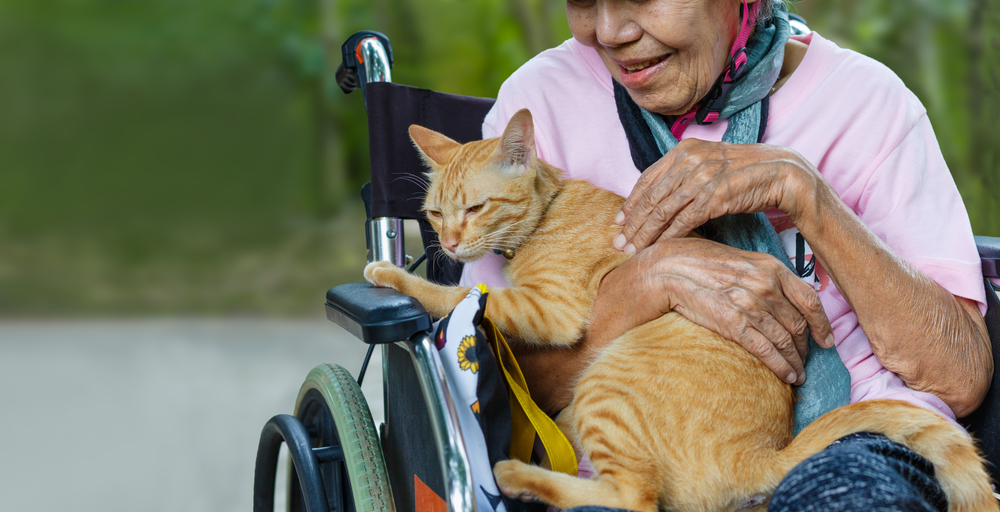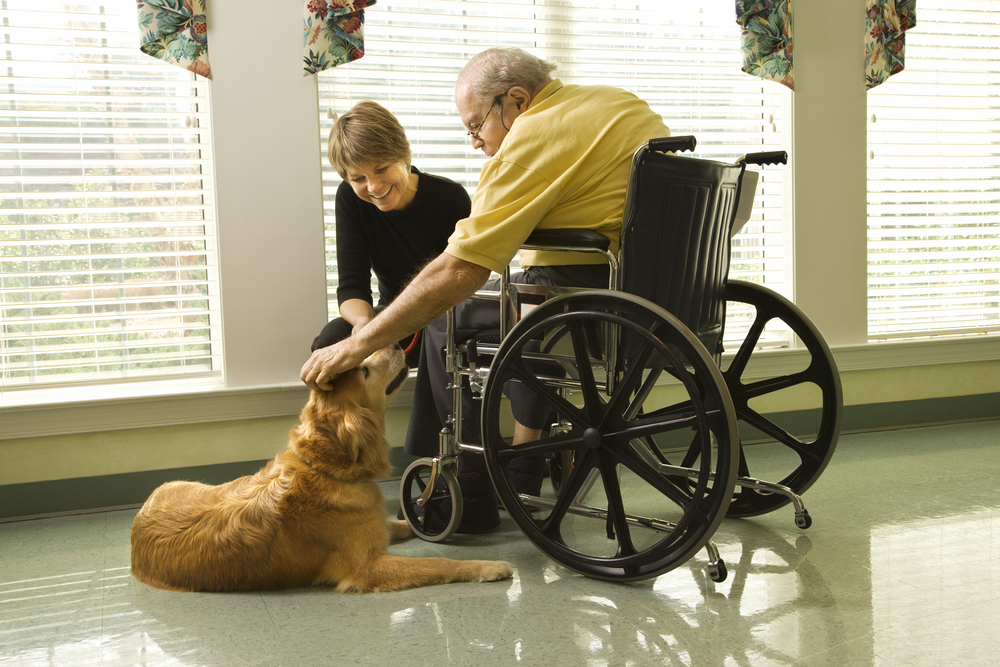 October 18, 2022
October 18, 2022
“Animals are such agreeable friends. They ask no questions; they pass no criticisms.” This quote from George Eliot lays out why so many people love having an animal friend around.
Who doesn’t have a fond memory from childhood or early adulthood with an animal? Something about friends who provide nothing but love and comfort brings a much-needed dose of serotonin to all of us when we are at our lowest or loneliest.
What Is Pet Therapy?
By definition, pet therapy is a type of therapy that uses dogs or other pets to improve the physical and mental health of patients with certain acute or chronic diseases.
As we age, our tendency to become depressed or lonely increases. One of the ways we can help our loved ones combat this is through contact with animals. Some seniors have their own pets, while others benefit from a therapy involving contact with animals.
These therapies can be done in various settings from professional to in-home. They can also include many kinds of animals, from the fully domesticated to farm varieties or even birds. The type of animal or pet therapy best for your loved one depends on their abilities and interests.
The Benefits of Pet Therapy
Many benefits can be found when your loved one starts pet therapy. They all fall under three main subgroups: emotional, physical, and mental.
Though all of these benefits work hand-in-hand, we will explore them separately to give more focus to each. As we get into the holiday season when loneliness and isolation can increase, consider these benefits for your loved one.

Emotional Benefits
Self-Esteem and Confidence: The introduction of quality time with pets and animals allows seniors to feel like they have the ability to do things independently. It helps them feel more confident in their care abilities for the animal while increasing their mobility confidence.
Improved Social Skills: The great thing about pets is that they will listen to you talk to them whether they understand you or not. They will never judge you if you mess up or lack confidence. Their unwavering love and comfort can help seniors build up their social skills, especially after a health setback such as a stroke, in an environment that is nothing but positive reinforcement.
Reduced Depression: It has been proven that animals provide a level of serotonin that benefits people who suffer from depression. The comfort of having an animal there who can provide silent love gives us endorphins that prevent feelings of depression.
Reduced Feelings of Loneliness: If we constantly or regularly have someone or something there to give us love and attention, we are less likely to feel lonely. This benefit to our loved one’s emotional well-being is self-explanatory. Spending even 30 minutes a day cuddling up to an animal of our choice can improve our whole day or week.
Increased Gentleness and Care: Being responsible for the well-being of someone apart from ourselves can become increasingly stressful as we age. One way that seniors can benefit from pet therapy is that it allows them to ease their way back into that ability. Animals and pets teach us how to be kinder, gentler beings.
Physical Benefits
Increased Exercise: Depending on what your loved one needs, an animal or pet could help them gain motivation to get out more. Taking a dog for a walk or interacting outside with a cat are both great ways to increase your loved one’s exercise mobility.
Lowered Blood Pressure: Increased confusion, frustration, and stress contribute to increased blood pressure. This means that helping your loved one find time to interact with animals, which have a natural calming factor, can show long-term positive effects on their blood pressure and overall health.
Increased Physical Skills: The simple act of caring for an animal for even a short period of time could benefit a senior’s physical skills. If they suffer from limited mobility, pet therapy could give them the push they need to participate in physical therapy exercises. Pet therapy can also be used to better your loved one’s strength so that – if they want to and it’s available – they could participate in increased treatments such as equine therapy.

Mental Benefits:
Decreased Depression, Anxiety, and Stress: As stated above under emotional benefits, the presence of animals can help seniors feel less depressed. They can also help lower stress and anxiety in seniors. The positive endorphins produced from being comforted by an animal you love can go a long way toward relieving anxiety, which helps seniors’ overall health.
Improved Mental/Memory Stimulation: Physical touch connects to our memories and mental acuity. Allowing seniors to interact regularly with pets or animals could help their mental sharpness. Memories fade, but if we can give them a reminder that involves love, comfort, and companionship, then we should explore those avenues.
Improved Sense of Purpose and Meaning: Seniors who lose parts of their mobility and independence tend to feel like their life lacks meaning or purpose. Adding an animal can help your loved one find motivation. Pets can bring simple joys back to their owners’ lives and help them find something to look forward to daily.
Calming the Effects of Dementia: Pets can help your loved one living with dementia be more interactive, especially when they cannot do so in social settings with other adults. There is just something about the presence of a nonverbal animal that gives confidence and serenity back to someone who is a stranger in their own world.
If you would like to learn more about how pet therapy can help your loved one, contact us today. We can walk you through how Accessible can bring support to your loved one and their pet therapy needs.



